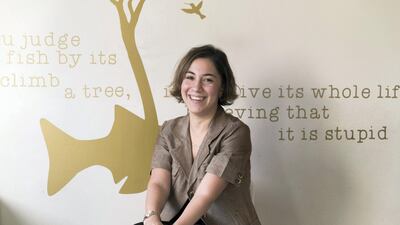Children as young as four have been victims of bullying and developed psychological disorders, counsellors advising schools during National Bullying Prevention Week have said.
The Ministry of Education has trained almost 700 school workers and counsellors since 2013 on the latest bullying prevention methods.
It hosted further workshops this month to bring 713 more educators up to speed with the latest techniques.
Counsellors working with children said bullies and their targets are becoming younger, and show the most noticeable change in behaviour.
“We are seeing kindergarten children who have developed eating problems because other kids would take their sandwiches, bury them in sand or make fun of what they are eating,” said Haneen Jarrar, a child psychologist at the Camali Clinic, Dubai.
“We see a lot of school refusals, changes in eating habits and general withdrawal.
“Children will often say they are being bullied, so parents should listen carefully to establish the facts and work with the school.”
Children who bully tend to have a positive attitude towards aggression, become easily frustrated with a quick temper and have an inability to conform to rules, psychologists said.
Other common traits are to use fear and intimidation to gain respect from others.
Counsellors and child psychologists have been hosting workshops in schools to create an anti-bullying culture, and offer cognitive behaviour therapy to those targeted.
“We see the effect of different types of bullying, verbal, social, physical and cyber bullying – an area becoming more common,” said Ms Jarrar.
“Bullying used to stop when you went home, but now it is 24/7 and has become so harmful for children.”
The Dubai British School, like others in the Taaleem group, encourage pupils to report bullying when they see it.
It also runs a mentoring programme to pair up older pupils with younger, vulnerable pupils.
“Senior primary pupils are given roles to act as playground buddies, maintaining a presence during break and play-times to ensure no kids are being intimidated or bullied and that no one is being left out,” said Brendon Fulton, DBS principal.
“We run regular parental workshops on how to look out for and deal with bullying, including cyber-bullying.
“These sessions are run by professionals who give tips on signs to look out for and strategies to help teenagers understand and deal with bullying issues.”
_________________
Read more:
Facebook linked to neurotic behaviour
Coaching manual to help UAE teenagers deal with stress
Google's landmark new Arabic safety courses aimed at safeguarding children in UAE
__________________
To encourage conversations around immoral social media usage, telecoms provider du has produced a collection of four hard-hitting films to illustrate its harmful and unethical nature.
The films address bullying and accidents, the two most frequent kinds of negative situations experienced online.
A 2017 global well-being report on student welfare found the UAE ranked eighth on a list of how common bullying was in schools, with 27 per cent of pupils claiming to be bullied regularly.
Linda Bonnar, a former teacher in Dubai who is now a lifecoach and author, said social media has offered the perfect environment for bullying.
“Social media is great in so many ways, but it unfortunately does provide a platform for young people to post and send inappropriate, harmful and hurtful messages to others,” she said.
“A lot of the factors have been around for years, such as people being unwilling to accept others for who they are in terms of their background, culture, race or religion.
“The anxiety and stress bullying creates in a young person’s life is a vicious circle and one that can be carried into adulthood.
“Schools do a fantastic job in not only addressing the problem, but also in educating our young people on what to do if they are in that situation.”


